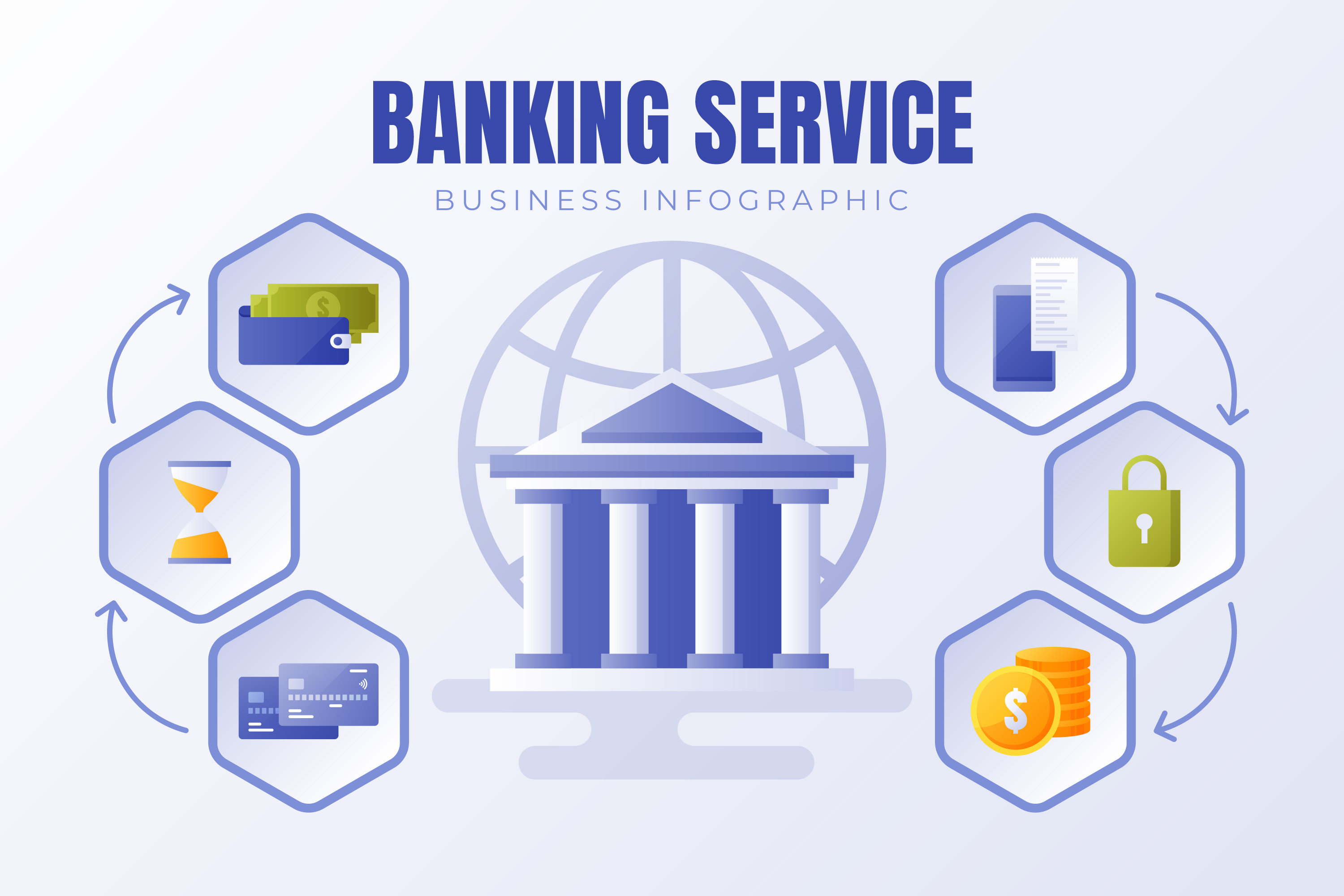Fintech innovation is rapidly supercharging the financial sector, creating a more streamlined, secure, and inclusive landscape for everyone. Partnerships between financial establishments, financial services companies, and cloud computing providers are fueling this exciting revolution.
Fintech adoption is on the rise globally, but the pace of change varies significantly across different regions and markets. Factors like smartphone penetration, existing financial infrastructure, and regulations play a crucial role in how quickly these innovations take hold.
Powering Fintech Innovation: Seven Key Technologies

Source: Freepik
The fintech landscape is undergoing a radical transformation driven by a wave of groundbreaking technologies. These seven key drivers are at the forefront of this revolution, empowering both financial organizations and financial services companies to innovate and redefine the future of finance:
- Artificial Intelligence (AI) and Machine Learning (ML): This dynamic duo is unlocking a treasure trove of possibilities. AI can analyze vast amounts of data to uncover hidden patterns, predict fraud attempts with remarkable accuracy, and even personalize financial products based on individual needs. Machine learning algorithms continuously learn and improve, further streamlining processes and automating repetitive tasks. Learn more about AI development and its costs in our post AI for Every Budget: Strategies for Cost-Conscious Businesses in 2024
- Blockchain: Beyond the BuzzBlockchain is a groundbreaking fintech innovation that underpins cryptocurrencies, but its potential extends far beyond them. Distributed ledger technology (DLT) creates a safe and transparent record-keeping system that enables streamlined transactions. This tamper-proof system fosters trust and unlocks the potential for innovative fintech instruments like smart contracts. These automated agreements can streamline complex business workflows, significantly reducing friction and boosting efficiency. For a deeper dive into how blockchain development is being leveraged to enhance security and implement Anti-Money Laundering (AML) practices within the fintech space, check out our related article: Blockchain Development and AML Practices: https://cyberbee.dev/blog/blockchain-development-and-aml-practices/.
- Big Data Analytics: Financial advisors and service companies hold mountains of data, but its true value lies in unlocking the insights it contains. Big data analytics empowers them to extract valuable information from this information. This can be used to improve risk management by identifying possible problems early on, enhance customer service through personalized recommendations, and develop new and innovative financial products tailored to specific needs.
- Cloud Computing: The days of expensive, on-premise infrastructure are fading. Cloud computing provides financial organizations and service companies with access to scalable, reliable, and cost-effective computing resources. This allows them to deploy innovative fintech solutions quickly and efficiently, without the burden of hefty upfront investments.
- Internet of Things (IoT): Our world is becoming increasingly interconnected, with everyday devices embedded with sensors and internet connectivity. The IoT has the potential to seamlessly integrate financial services into our daily lives. Imagine automatically paying for tolls while driving or receiving real-time updates on your finances through your smart home device. These are just a few possibilities of how IoT can create a more personalized and convenient financial experience.
- Open APIs: Collaboration is key to fostering innovation. Open APIs (Application Programming Interfaces) act as a bridge between the financial sector and third-party developers. By sharing data securely through APIs, financial institutions can unlock a wealth of creativity and expertise from the broader developer community. This fosters a more open and interconnected financial ecosystem, leading to the development of innovative new financial solutions.
- Biometrics: Security and convenience go hand in hand with biometrics. Fingerprint scanners, facial recognition, and voice authentication are replacing traditional passwords, offering a more reliable and user-friendly way to retrieve data from financial accounts and verify identity. This not only enhances security but also streamlines the user experience.
These seven key technologies are just the tip of the iceberg. As they continue to evolve and converge, we can expect even more groundbreaking innovations that will redefine the way we manage our finances and interact with the financial system.
Transforming Financial Transactions

Source: Freepik
Fintech is revolutionizing how we manage our money on a daily basis. Here’s a closer look at some key innovations driving this change:
Mobile payments and wallets
Gone are the days of fumbling for cash or swiping cards. Mobile payments and digital wallets now offer a impregnable and convenient way to pay almost anywhere, simply by tapping your phone. These solutions integrate seamlessly with smartphones, allowing you to make purchases in stores, send money to friends, or pay bills instantly.
Alternative lending and financing
Fintech is making it easier for everyone to get the financial resources they need. This includes innovative solutions like peer-to-peer (P2P) lending platforms, which connect borrowers directly with lenders, often offering more competitive rates than traditional banks. Additionally, short-term loans provide quick access to funds for unexpected expenses, and alternative credit scoring models that consider a wider range of data points beyond just credit history can help those who may have been excluded from traditional lending options.
Real-time processing
Say goodbye to waiting days for transactions to clear. Real-time processing allows for instant settlements, meaning your money moves faster. This translates to faster settlements for your transferred funds, speedier payment processing for businesses you pay, and enhanced cash flow control.
Fintech’s Expanding Horizons: Beyond Traditional Banking

Source: Freepik
Fintech’s reach extends far beyond the walls of traditional banking, redefining a diverse range of financial services. Here’s a glimpse into how fintech is redefining financial experiences across various sectors:
Financial Transactions
Mobile wallets and digital payment solutions are making everyday transactions faster, more protected, and more convenient. Real-time processing allows for instant settlements, while innovative lending models like peer-to-peer (P2P) lending and alternative credit scoring are expanding access to capital for individuals and businesses. Cross-border solutions are simplifying international transactions, fostering a more interconnected global financial landscape.
Investment Management and Wealth Management
Gone are the days of limited investment opportunities. Financial technology platforms are democratizing access to investment opportunities through automated investment advice (robo-advisors) and user-friendly digital platforms. These solutions empower individuals of all backgrounds to take control of their financial futures, regardless of their investment experience.
Risk Management and RegTech
Regulatory compliance can be a complex and time-consuming burden for financial sector. RegTech solutions leverage automation and data analysis tools to streamline this process, ensuring adherence to regulations while freeing up valuable resources. This allows fintech businesses to focus on financial innovation and delivering exceptional customer service.
Insurance (InsurTech)
The insurance industry is undergoing a data-driven revolution. InsurTech solutions are enabling risk assessment with advanced analytics capabilities, leading to personalized insurance products and streamlined claims processing. This not only benefits insurance companies but also allows customers to access more tailored coverage options and a smoother claims experience.
Accounting and Bookkeeping

Source: Freepik
Automating tedious tasks like data entry and reconciliation, fintech is revolutionizing the way businesses manage their finances. Innovative data pipelines and instruments deliver real-time visibility into your finance, empowering businesses to make informed decisions and optimize their financial health.
Crowdfunding
Fintech platforms have opened doors for startups and entrepreneurs seeking to raise capital. Crowdfunding allows them to connect with a wider pool of potential investors, bypassing traditional fundraising hurdles. This fosters fintech innovation and empowers individuals to support businesses they believe in.
Payment Security
Fintech prioritizes robust security measures. Technologies like tokenization replace sensitive financial data with unique identifiers, reducing the risk of fraud. Multi-factor authentication adds an extra layer of security, ensuring only authorized users can access financial accounts.
Supply Chain Finance
Streamlining financial processes within supply chains is another area where fintech shines. Innovative solutions improve access to working capital for businesses, promoting smoother operations and greater efficiency throughout the supply chain.
Personal Finance Management
Taking control of your finances is easier than ever with personal finance management apps. These user-friendly tools help individuals track expenses, create budgets, and set financial goals. By providing real-time insights and automating tasks, these fintech innovation empowers users to make informed decisions and achieve their financial aspirations.
This is just a starting point. As fintech innovation continues to evolve, we can expect even broader applications that reshape the way we manage our finances and interact with the financial system.
Does Fintech Innovation Apply Only to Banking?
Absolutely not! While financial technology initially emerged to disrupt the traditional financial institutions, especially banking sector, its reach has significantly expanded.Today, fintech has transcended its banking roots, evolving into a broad term that encompasses a wide range of financial services offered not just by banks, but by other financial institutions as well. As we saw in the previous section (“Fintech’s Expanding Horizons”), it’s revolutionizing areas like investment management, insurance, accounting, and even crowdfunding.
By harnessing the power of fintech innovation to develop groundbreaking solutions that democratize access to finance as a service, streamline processes, and safeguard user data, fintech is spearheading progress in this ever-evolving landscape.
The Spark of Change: What is Innovation in Fintech?

Source: Freepik
Fintech innovation isn’t just about creating cool technology; it’s about the positive impact it has on the financial ecosystem. Here are some key aspects that define successful fintech innovation:
- Focus on User Experience: User-friendly interfaces and intuitive design are crucial. Fintech solutions should be easy to navigate and understand, even for individuals with limited technical experience. A delightful user experience fosters customer satisfaction and encourages adoption.
- Increased Efficiency and Automation: Repetitive tasks and complex processes are prime targets for automation. By leveraging AI and other technologies, fintech can streamline financial operations, reduce errors, and free up resources for more strategic initiatives.
- Accessibility and Financial Inclusion: Fintech has the potential to bridge the gap and provide financial services to underserved populations. This could involve mobile banking solutions in remote areas, alternative credit scoring models for individuals with limited credit history, or micro-insurance solutions tailored to specific needs. Financial inclusion is not just a noble goal, it’s also a driver for economic growth and stability.
- Security and Data Protection: Protecting sensitive financial data is paramount. Fintech solutions must incorporate robust security measures to prevent fraud and ensure user trust. This includes technologies like encryption, multi-factor authentication, and data anonymization.
By prioritizing these core principles, fintech innovation can empower financial institutions, service companies, and ultimately, the end-user to experience a more efficient, protected, and inclusive financial landscape.
Building the Ecosystem: The Four Pillars of Fintech

Source: Freepik
The impressive advancements in fintech wouldn’t be possible without a robust ecosystem supporting them. Here, we explore the four fundamental pillars that work together to empower fintech innovation:
Financial Institutions
These institutions form the foundation of the financial industry, providing traditional financial products and services like loans, deposits, and investments. They play a crucial role by collaborating with fintech companies to leverage fintech innovation and enhance financial industry offerings. Imagine for example, a bank partnering with a fintech startup to offer a mobile payment solution or a robo-advisor platform for long-term investment strategies. This cooperation allows established institutions to embrace innovation while fintech companies benefit from the reach and expertise of the financial institution.
Financial Services Companies
These companies are the driving force behind innovation, developing and offering a wide range of cutting-edge financial products and services built on fintech solutions. They may be startups with disruptive ideas or established players embracing fintech innovation to provide services like peer-to-peer lending platforms, digital insurance solutions, or automated accounting tools. These companies take advantage of the infrastructure provided by the other pillars to bring their innovative ideas to life.
Cloud Computing Service Providers
These providers offer the essential infrastructure that underpins the entire fintech ecosystem. They deliver scalable, secure, and cost-effective cloud computing solutions that enable fintech companies to develop, deploy, and manage their innovative applications without hefty upfront investments. Companies like Amazon Web Services (AWS), Microsoft Azure, and Google Cloud Platform (GCP) are key players in this space. Cloud services allow fintech companies to be agile and adaptable, scaling their infrastructure as their business grows.
Financial Sector Regulators
While not directly involved in innovation, regulators play a critical role in fostering a healthy and secure financial environment for everyone. They establish frameworks and regulations that encourage responsible innovation while mitigating potential risks associated with new technologies like cryptocurrencies. Striking a balance between promoting innovation and ensuring consumer protection is essential for building trust and long-term sustainability in the fintech ecosystem. Regulators work with the other pillars to ensure that innovation happens within a responsible and secure framework.
Fintech Startups: Fueling Innovation with Agility and Vision
Fintech startups are the lifeblood of disruption in the financial sector. Nimble and innovative, they are at the forefront of developing cutting-edge software solutions that address specific pain points or entirely redefine how we interact with financial services. These startups often leverage private equity funds to fuel their growth. The funds provide them with the necessary capital to scale operations, invest in research and development, and bring their groundbreaking ideas to market.
This access to funding allows fintech startups to take risks, experiment with new technologies, and challenge the status quo. As a result, they are constantly pushing boundaries and reshaping the financial landscape.
By working together, these four pillars create a dynamic and collaborative environment where financial institutions, service companies, cloud providers, and regulators can all contribute to the continued growth and success of fintech innovation. Each pillar plays a unique and vital role, and their collaboration is what fuels the exciting advancements we see in the financial industry today.
The Future of Fintech: A Glimpse Ahead

Source: Freepik
Fintech’s future is bright, fueled by continuous advancements. Expect deeper integration of AI and Big Data for personalized advice and risk management. Emerging technologies like facial recognition and potentially mainstream cryptocurrencies will enhance security and create innovative financial instruments. Fintech will remain a champion for financial inclusion, providing accessible banking services even to underserved populations. User experience will be king, with seamless interfaces, AI chatbots, and voice-activated tools for a more natural financial journey. Collaboration between established institutions, startups, and tech companies will be key, fostering open ecosystems for even faster innovation. As technology and regulations evolve, the future of fintech promises a more efficient, secure, and inclusive fintech industry for all.
Ready to be a part of the future? Cyberbee is at the forefront of fintech innovation, developing solutions that empower businesses and individuals to thrive in the evolving fintech industry. Contact us today to learn how we can help you navigate the exciting world of fintech!



